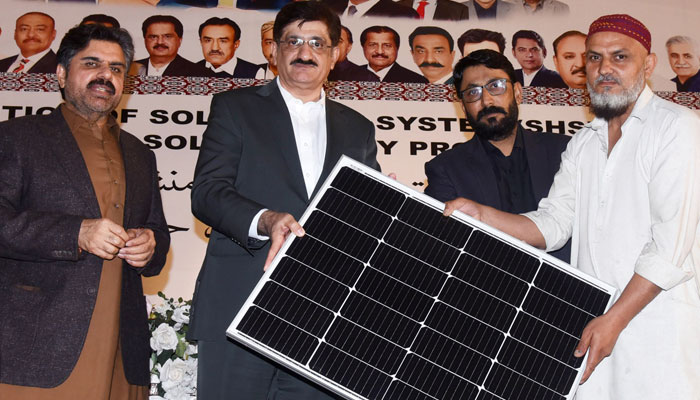Sindh begins distributing solar home systems to poor households
CM credited President for bringing then PM to Thar for project’s inauguration, ensuring federal-level support
KARACHI: Sindh Chief Minister Syed Murad Ali Shah on Wednesday said his government has begun distributing solar home systems (SHSs) to 200,000 low-income households, adding that Pakistan Peoples Party (PPP) Chairman Bilawal Bhutto Zardari has instructed him to procure another 300,000 solar units for distribution.
Shah was speaking at a ceremony for the distribution of SHSs among vulnerable communities, organised by the Sindh Solar Energy Project (SSEP) at a banquet hall near the KPT Interchange, DHA Phase-I.
He said that this initiative is designed to provide affordable and sustainable electricity, helping families that are still recovering from the devastating floods of 2022. “We’re installing 270MW solar power plants, which will provide electricity at a rate of Rs9.8 per unit.”
He recounted the hurdles faced by his government in promoting renewable energy and developing the Thar coal project. He said that when the PPP initiated a solar energy project, restrictions were imposed on renewable sources such as wind and solar energy, hindering Sindh’s efforts toward sustainable energy solutions.
In response, the Sindh government decided to establish imported coal-based power plants to meet the province’s energy needs, he added.
He also said that in 2014 the government solarised 600 schools in Nagarparkar and launched two 25MW solar power schemes in Sukkur. However, he lamented, despite these efforts, federal authorities refused to grant approvals for additional power generation and claimed that Pakistan already had sufficient electricity production.
“If that’s true, why does the entire Sindh, including Karachi, still suffer from severe load-shedding?” he asked. He asserted that the issue is not a surplus of electricity but rather the federal government’s inability to produce power efficiently.
He stressed that to tackle these challenges, his government initiated a renewed push for green energy, but the Centre continued prioritising imported coal-based power plants such as those in Sahiwal. He pointed out that critics also dismissed Thar coal as unsuitable for electricity production, creating further obstacles for Sindh’s energy plans.
“In 2013-14 the then prime minister Raja Pervez Ashraf approved the Thar coal project, but securing loans for its execution remained difficult due to a lack of federal guarantees,” he said, adding that even after the 2016 project agreement, doubts were raised about Thar coal’s feasibility.
He credited President Asif Ali Zardari for bringing the then PM Nawaz Sharif to Thar for the project’s inauguration, ensuring federal-level support. He said that despite financial constraints in 2015, the Sindh government worked tirelessly to secure loans under strict conditions.
“They told us that if the project defaulted, they’d deduct payments from Sindh’s NFC [National Finance Commission] Award, but we still went ahead with it.”
Shah said the Thar coal project began yielding results in 2018, when Bilawal visited the mining site. He added that the first 230MW power plant powered by Thar coal was inaugurated by Bilawal, while the final phase was inaugurated by Bilawal and PM Shehbaz Sharif.
“Today Pakistan’s cheapest electricity is produced from Thar coal, marking a significant milestone for Sindh’s energy sector.”
He noted that despite initial scepticism, those who once doubted Thar coal’s viability are now demanding its increased extraction to convert imported coal-based power plants to local coal usage.
Additionally, he said, there is growing interest in utilising Thar coal for Pakistan’s cement industry as an alternative to expensive imported fuel.
Recognising its potential, the Sindh government is now collaborating with the Centre to lay a dedicated railway line for Thar coal’s transportation, further strengthening the province’s energy independence, he added.
The CM said that the 2022 floods served as a stark reminder of Sindh’s vulnerability. “The Sindh solar project is a crucial step towards energy independence, enabling families to power their lives, children to study, and businesses to thrive, even in the face of adversity. We’re building a more resilient and sustainable Sindh.”
He said the SSEP’s Component-III would provide heavily subsidised SHS kits to eligible households for a nominal price of Rs6,000.
The Sindh government is actively forging partnerships with Chinese companies to develop wind-solar hybrid energy projects, including a 350MW and a 75MW initiative, which were finalised during President Zardari’s recent visit to China, he added.
He reiterated his government’s commitment to providing 300 units of free electricity to low-income families, a main promise in the PPP’s manifesto, and a step towards achieving the Sustainable Development Goals.
He stressed that the Sindh government aims to complete the distribution of all 200,000 SHS kits by July, with a target of 400 kits per district each week. He pointed out that this ambitious timeline reflects the government’s urgency in delivering tangible benefits to communities in need.
Energy Minister Nasir Hussain Shah said SHSs’ distribution is being carried out equally across all 30 districts of the province, utilising the expertise of established NGOs to ensure efficient last-mile delivery.
Beneficiaries were carefully selected from the Benazir Income Support Programme database, targeting families with a PMT score between 21 and 50, ensuring that the most vulnerable receive priority, he added.
The CM said the world is transitioning to clean energy, and Sindh is determined to be a leader in this transformation, with the support of the World Bank and other development partners.
The SSEP is a significant step towards a greener, more equitable future, demonstrating the power of sustainable energy to uplift lives and build a more resilient province, he added.
-
 Selena Gomez Reveals Sweet Reason For Wanting Big Family Revealed On Podcast
Selena Gomez Reveals Sweet Reason For Wanting Big Family Revealed On Podcast -
 Zendaya Revealed One Accent She Would Like To Pull Off One Day After Taking Major Step With Tom Holland
Zendaya Revealed One Accent She Would Like To Pull Off One Day After Taking Major Step With Tom Holland -
 Starlink Bridges Digital Divide: Global Internet Now Reaching World’s Most Remote Regions
Starlink Bridges Digital Divide: Global Internet Now Reaching World’s Most Remote Regions -
 'An Avengers Movie Every 20 Minutes': Seth MacFarlane Gets Candid About Taxing 'Ted' Production
'An Avengers Movie Every 20 Minutes': Seth MacFarlane Gets Candid About Taxing 'Ted' Production -
 Prince William, Kate Middleton 'drastic Measures' For Future Of Monarchy Exposed As Pressure Mounts
Prince William, Kate Middleton 'drastic Measures' For Future Of Monarchy Exposed As Pressure Mounts -
 David, Victoria Beckham Send Lovely Birthday Wishes To Son Brooklyn Despite Feud
David, Victoria Beckham Send Lovely Birthday Wishes To Son Brooklyn Despite Feud -
 'Sinners' Star Recalls One Of The Coolest Scenes From Filming
'Sinners' Star Recalls One Of The Coolest Scenes From Filming -
 Eco-fashion Designer Amanda Navaian Sues King Charles Charity
Eco-fashion Designer Amanda Navaian Sues King Charles Charity -
 MGK's Flirty Comment On Megan Fox's Sultry Pics Fuels Reunion Buzz
MGK's Flirty Comment On Megan Fox's Sultry Pics Fuels Reunion Buzz -
 'He Was Really Reminiscing': Clinton Sparks Reactions After Being Caught Smiling At Epstein Photos
'He Was Really Reminiscing': Clinton Sparks Reactions After Being Caught Smiling At Epstein Photos -
 NASA Restructures Artemis Mission, Pushing First Lunar Landing To 2028
NASA Restructures Artemis Mission, Pushing First Lunar Landing To 2028 -
 Young Sebastian Bach: Wild Photos From His Long-haired Rock Star Era Amid Christina Applegate Confession
Young Sebastian Bach: Wild Photos From His Long-haired Rock Star Era Amid Christina Applegate Confession -
 Royal Family All Set To Show Unity As King Charles 'plans Abdication'
Royal Family All Set To Show Unity As King Charles 'plans Abdication' -
 Astronomers Spot Nearly Invisible Galaxy Packed With Dark Matter
Astronomers Spot Nearly Invisible Galaxy Packed With Dark Matter -
 Zach Braff Opens Up On Childhood Friendship With Singer Lauryn Hill
Zach Braff Opens Up On Childhood Friendship With Singer Lauryn Hill -
 Kim Jong Un Searches For Reason To Join Iran War In Viral Memes
Kim Jong Un Searches For Reason To Join Iran War In Viral Memes




